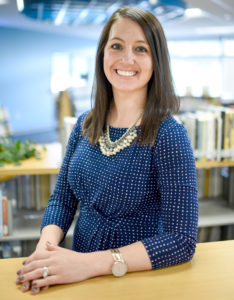For Immediate Release
Contact: Daniel Wackershauser, Marketing and PR Specialist
Phone: 608.822.2303
Mail: 1800 Bronson Blvd., Fennimore, WI 53809
Date of Release: March 31, 2022
Southwest Tech represented on Rural Justice Task Force
Fennimore -Holly Clendenen, chief student services officer at Southwest Wisconsin Technical College, is one of 63 leaders selected for the new national Rural Justice Task Force. The task force, launched by the Legal Services Corporation (LSC), aims to address critical issues with access to justice in rural communities across the country. The goals of the task force include raising awareness of the civil legal needs of rural residents, profiling model programs that provide effective legal services or information to those in rural communities, recommending strategies for engaging private attorneys to provide pro bono legal assistance, and identifying opportunities for state and federal legislative assistance.

Holly Clendenen
In the spring of 2021, Southwest Tech joined the Wisconsin-based legal aid program Lawyers for Learners, which makes free legal help more accessible to college students and community members. Clendenen is hopeful to shine a light on this program while working with the task force, while also learning about other models across the country that could be incorporated into Southwest Tech’s offerings to assist students and the community.
“What we have seen so far are cases where students and community members don’t know their issue is a legal issue,” said Clendenen. “Sometimes, when people are renting an apartment or house they don’t know what their rights are. Also, being able to afford legal services and have transportation to access the legal services can be a challenge.
The top requests through Lawyers for Learners across Wisconsin in 2021 were child support and family law, housing, criminal records and expungement, and driver’s license restoration.
Clendenen’s term with the task force will run 12-18 months. During that time she will serve on the 24-member Model Practices and Innovative Legal Service Delivery working group.
Although there are roughly four lawyers for every 1,000 people nationwide, that number is skewed by the high concentration of lawyers in cities. In fact, 40 percent of all counties have fewer than one lawyer per one thousand residents.
The rural lawyer population is aging and young lawyers plagued with student loan debt are flocking to higher-paying positions offered in cities. Consequently, as these rural lawyers retire, they often find no one to take over their practices. This pattern indicates that legal deserts will continue to grow if strategic, targeted interventions are not made.
“Access to justice is not only about helping clients—when we think about access to justice, we always talk about, and are generally focused on, the client served or not served,” said Rebecca Rapp, general counsel and chief privacy officer of Ascendium and co-chair of the Rural Justice Task Force. “The justice gap has a larger pernicious effect: communities that lack attorneys can experience a justice vacuum that fundamentally changes the balance of power between people and the institutions they rely on.”
As Clendenen moves through the process, she is hopeful there will be additional training for faculty and staff on campus to assist students with referrals for judicial services. “Once our faculty and staff know what students need help with they are very willing to help find those resources and get them connected,” she said.
According to LSC’s 2017 Justice Gap Report, nearly 10 million rural residents have family incomes below 125 percent of the federal poverty line, which is the income threshold for qualifying for legal assistance from the legal aid organizations that LSC supports. Three-quarters of rural households experienced at least one civil legal problem the year prior, including 23 percent that experienced six or more problems. Only 22 percent reached out for legal help, and 86 percent received no or inadequate help for their legal problems.
The law firm of Quarles and Brady LLP is providing pro bono project assistance, and Ascendium Education Group, Inc., a philanthropy and federal loan guarantor committed to increasing access to and success in post-secondary education and training, has underwritten the initiative.
The final report of findings and recommendations from the Rural Justice Task Force is slated to be published in the spring of 2023.
LSC is an independent nonprofit established by Congress in 1974 to provide financial support for civil legal aid to low-income Americans. The Corporation currently provides funding to 132 independent nonprofit legal aid programs in every state, the District of Columbia, and U.S. territories.
| Southwest Wisconsin Technical College is one of 16 institutions that comprise the Wisconsin Technical College System. Southwest Tech offers more than 60 programs in a wide variety of disciplines. Courses are offered on campus, online and in a blended format. The college provides apprenticeship, certificate, technical diploma, and associate degree programs that respond to district workforce needs and prepare student for family-sustaining jobs and career advancement. |
